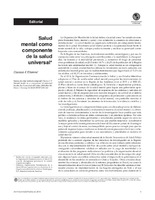Mental health as a component of universal health
Salud mental como componente de la salud universal
| dc.contributor.author | Etienne, Carissa F. | |
| dc.date.accessioned | 2018-09-25T23:18:07Z | |
| dc.date.available | 2018-09-25T23:18:07Z | |
| dc.date.issued | 2018-09 | |
| dc.identifier.citation | Etienne CF. Mental health as a component of universal health. Rev Panam Salud Publica. 2018;42:e140. https://doi.org/10.26633/RPSP.2018.140 | es_ES |
| dc.identifier.issn | 1680 5348 | |
| dc.identifier.uri | https://iris.paho.org/handle/10665.2/49513 | |
| dc.description.abstract | The World Health Organization defines health as “a state of complete physical, mental and social well-being and not merely the absence of disease or infirmity.” Mental health, by this definition, is an essential building block of health. Good mental health enables people to cope with the normal stresses of life, work productively, and fulfill their potential by contributing to their communities. In the Region of the Americas, mental, neurological, and substance use disorders are among the principal contributors to morbidity, disability, injuries, and premature mortality, and they increase the risk of other health problems. During 2013, between 18.7% and 24.2% of the Region’s population had a mental disorder. Although mental health is an essential component of overall health, there exist critical treatment gaps: that is, significant proportions of people with serious mental illness do not receive treatment, up to 73.5% among adults and 82.2% among children and adolescents. | pt_BR |
| dc.description.abstract | La Organización Mundial de la Salud define a la salud como “un estado de completo bienestar físico, mental y social, y no solamente la ausencia de afecciones o enfermedades”. La salud mental es, según esta definición, un componente fundamental de la salud. Una buena salud mental permite a las personas hacer frente al estrés normal de la vida, trabajar productivamente y realizar su potencial contribuyendo a sus comunidades. En la Región de las Américas, los trastornos mentales, neurológicos y por uso de sustancias están entre los principales contribuyentes a la morbilidad, la discapacidad, las lesiones y la mortalidad prematura, y aumentan el riesgo de presentar otros problemas de salud; en 2013 entre 18,7% y 24,2% de la población de la Región ha tenido una enfermedad mental. Aunque la salud mental es un componente esencial de la salud, existen brechas críticas de tratamiento (es decir, personas con enfermedad mental grave que no reciben tratamiento) que llegan hasta el 73,5% en los adultos y el 82,2% en los niños y adolescentes. | es_ES |
| dc.language.iso | en | en_US |
| dc.language.iso | es | en_US |
| dc.relation.ispartofseries | Rev Panam Salud Publica;42, sep. 2018 | es_ES |
| dc.rights | Attribution-NonCommercial-NoDerivs 3.0 IGO | * |
| dc.rights.uri | http://creativecommons.org/licenses/by-nc-nd/3.0/igo/ | * |
| dc.subject | Mental Health | en_US |
| dc.subject | Neurology | en_US |
| dc.subject | Substance-Related Disorders | en_US |
| dc.subject | Salud Mental | es_ES |
| dc.subject | Neurología | en_US |
| dc.subject | Trastornos Relacionados con Sustancias | en_US |
| dc.title | Mental health as a component of universal health | en_US |
| dc.title | Salud mental como componente de la salud universal | es_ES |
| dc.type | Journal articles | en_US |
| dc.rights.holder | Pan American Health Organization | en_US |
| paho.articletype | Editorials | en_US |
| paho.isfeatured | 0 | en_US |
| dc.identifier.doi | https://doi.org/10.26633/RPSP.2018.140 | |
| paho.source.centercode | US1.1 | en_US |
| paho.subject | Cat 2. Noncommunicable Diseases and Risk Factors | en_US |
Files in this item
This item appears in the following Collection(s)
-
Pan American Journal of Public Health
Revista Panamericana de Salud Pública






